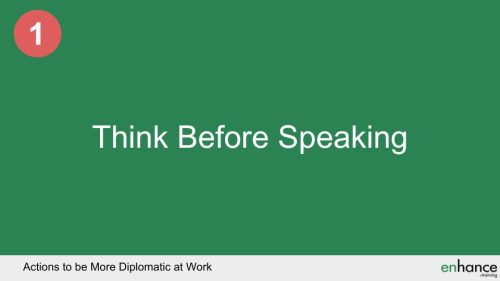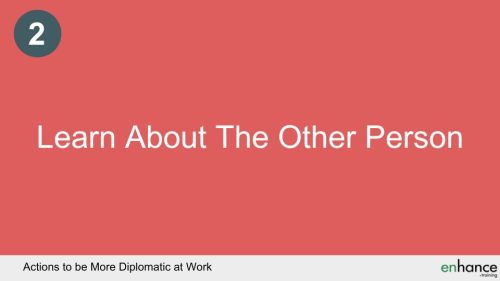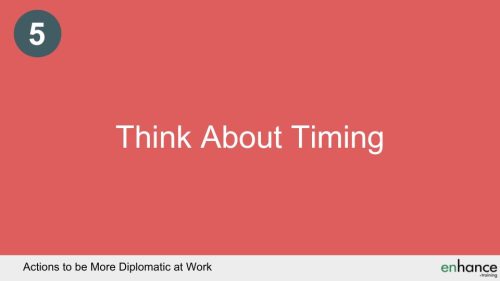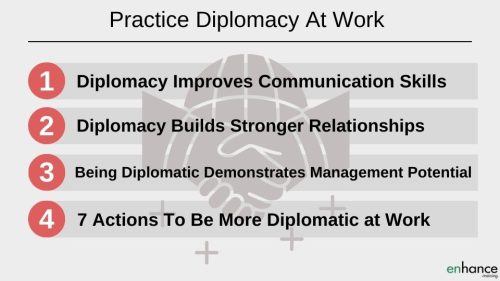7 Actions To Practice Diplomacy at Work – Avoid Offending Colleagues

Practice diplomacy at work and you will go further in your career, be liked and appreciated by more people, build better relationships and be seen as more professional. Being diplomatic at work is not about being untruthful or manipulating people – it is about packaging your message in a more persuasive or palatable form.
When you are diplomatic and tactful, you can be a lot more honest and direct with feedback and with expressing your opinion and views – without annoying or upsetting other people.
Practicing being diplomatic is a choice. I have been in plenty of meetings when managers discuss who to promote, and those that are not diplomatic, that aren’t able to communicate directly and honestly without offending rarely get considered for promotion.
Being able to get on with anyone and manage and maintain good working relationships is a must for anyone who is serious about their career and wants to enjoy being at work.
7 Actions To Practice Dilopmacy At Work – Avoid Offending Colleagues
1. Diplomacy Improves Communication Skills
2. Diplomacy Builds Stronger Relationships
3. Being diplomatic Demonstrates Management Potential
4. 7 Actions to be more Diplomatic at work
Expressing opinion without offending is a great skill to have and is definitely valued by management. Being able to avoid offending others at work will help you build good relationships with a wider range of colleagues and make your time at work a lot more enjoyable.
Watch on YouTube
Listen on Podcast
Firstly – Practice diplomacy at work to improve your communication skills
The minute you offend, annoy, or make someone angry, they are not going to listen and take in what you are saying.
Avoid offending colleagues by using a pleasant, light tone of voice, have relaxed body language and use neutral wording. You can give a person quite a bit of negative feedback and they won’t be particularly offended.
An example of being diplomatic at work – you might be thinking “this report is rubbish, I am going to have to spend an hour reworking it” but you might say “It appears you had quite a few challenges writing this report. I know getting the right focus and tone is not easy. Shall we sit down together, and I will take you through how I would have written sections of this report. Would that help you for next time?”
Being diplomatic at work helps you communicate. Other people are much more likely to take in what you say or write and make the effort to understand the message. One half of communication relies on the person you are communicating to. Make it as easy as possible for them – communicate with diplomacy.

Secondly, Practice diplomacy at work to strengthen your professional relationships
Which of these two people would you prefer to work with and like more:
The first person is nice and good at what they do. They are direct, to the point and very honest. They make statements or give feedback in a way that leaves you feeling a bit bruised at times, emotionally stamped on – which takes energy for you to recover from.
The second person is equally nice and good at what they do. Their messaging is also direct and honest, so you know exactly where you stand. Yet they always craft their messaging carefully to avoid upsetting you, to take account of your feelings.
Most will prefer the second person as working with them is easier and less emotionally draining. You would also feel a lot safer and appreciate the effort the other person puts in to look after your feelings.
Being a person that is easy to like and feel safe around – encourages others to open up and reveal more of themselves, their thoughts, feelings, hopes and dreams. When you know and understand more about the other person, building trust and meaningful personal and professional relationship with them is a lot easier.
At work, when you have good relationships with a larger range of colleagues, you are much more likely to do a better job. We all depend on others to do our jobs well.
Diplomacy, likeability, and trust is a powerful combination for building professional and personal relationships. Practice each.

Thirdly, Practice diplomacy at work to demonstrate your management potential
Being a manager thrusts you into needing to build and manage a wider range of relationships – with team members, with peers, with bosses, with suppliers and with customers.
To do our jobs well as managers, we need to get the best we can from all the people we interact with. Being tactful and diplomatic keeps those people on side and happy with us. When they like, appreciate and respect us – they are so much more likely to worker harder on our projects, deliver on time, buy from us as customers, not lets us down as suppliers and so on.
Demonstrate diplomacy in the workplace and you build confidence with your bosses that you can successfully manage all these important relationships.
Managers also need to provide bad news and corrective feedback – situations that can easily lead to negative impacts on relationships and the work being done by teams.
Be diplomatic at work and a person that avoids offending colleagues and you demonstrate that you should be able to manage in the bad times as well as the good times.

7 Actions to be more diplomatic at work
Develop the habit of thinking before speaking. Think about what you plan to say and how this will be taken by the other person. Just the act of consciously thinking through how what you might say will come across will influence and change what you actually say. Most people will pick up on the effort you put in and respond positively towards you. Developing the habit of thinking before speaking will feel a little awkward to start with. With practice you will be able to do this naturally while speaking.
Second, to avoid offending others, learn about the other person quickly.
Practice actively listening and observing what gets them excited, what causes them to hesitate, what gets them angry etc. Put yourself in their shoes and consider their wants, needs, ambitions, hopes, dreams and feelings. If you don’t know them, then keep what you say neutral until you know them better. The better you know them, the better you will be able to navigate around areas that they are sensitive about. Adapt your communication style to best suit the person you are communicating with.
Third, in practicing diplomacy at work, control how you express your emotions.
The more you practice observing yourself the better you will become at controlling how you express your emotions. Get to know what makes you angry and annoyed, what behaviours you find hurtful, what makes you impatient etc.
When you recognise your own negative emotions practice expressing them in a way that does not negatively impact the other person. If the other person has said something hurtful, don’t respond with an angry tone of voice giving them a hard time. Use a calm, neutral tone of voice and state that you found what they said hurtful. Control how you express your emotions.
Fourth, to be diplomatic, you must manage your body language
Including your tone of voice. Pay attention to the volume of your voice, the pace, the tone and the pauses you are using. Pay attention to how you are sitting and how your face is showing emotions. Work at being more conscious of what you are doing. Observe the other persons reactions and responses to get feedback on how you are doing. Keep your body language and tone of voice – neutral to positive. Rain in feelings of anger annoyance and other negative emotions and keep them out of your voice and body language.
Fifth, to avoid offending co-workers, think carefully about your timing
For example, don’t ask them to do additional work after they have told you they will have to work the weekend. Think carefully about when to ask for help and when to offer help. If you can’t wait, then acknowledge that the timing is poor to the person before asking. This helps to take some of the sting out of the situation. Be aware of and choose your timing.

Sixth, in practicing diplomacy at work the words you use matter
Choose words that the other person understands and uses. Definitely choose words that don’t insult, inflame or create negative emotions in the other person. Choose words that are appropriate and sensitive to the situation. This is not as easy as it might look. Your knowledge of the other person’s thoughts and feelings will help you chose. Their body language and voice as far as they show their emotions will help. If in doubt, chose more neutral words that are less likely to drive strong emotions. An example of being diplomatic at work – if you think an idea is rubbish, you don’t say “this is rubbish”, you might say “I am not sure that is the best approach for this situation because…”
Seventh, in practicing diplomacy at work, beware of cultural differences
I have worked in many international businesses and each country does things slightly differently. The British are very polite and not very direct. The South Africans are much more direct and straight talking. The Israeli culture is even more direct and brash. When you are communicating, you have to take these differences into account when going through the previous six actions. Adapt your style and communication to the culture of the person you are talking with.

Being diplomatic at work is a skill that requires practice to get good. Understanding what you need to do is a very valuable starting point, otherwise you will be practicing the wrong things which won’t help you much.
Make the time to practice. Being more diplomatic at work will be hard at first but gets easier and easier with practice. Eventually, you will practice diplomacy at work without really thinking about it consciously.
In Summary
Nearly everyone has to get on with a wide range of people at work. We all have different wants, needs, views, backgrounds and ambitions. We will all produce different ideas and different solutions and we will not always agree.
There are huge benefits to being diplomatic at work. The manager benefits of not offending others are even greater.
By being diplomatic you will:
- Communicate better as the other person is more likely to take in what you are saying
- Build stronger relationships with more people as you will be trusted to be considerate of their feelings
- Have more influence over others and be better at persuading and getting what you want
- Be more effective in your job, no matter what job you do
As a quick recap the 7 actions to practice diplomacy at work and avoid offending co-workers include:
- Think before you speak
- Actively listen and get to know them
- Control your emotions
- Manage your body language
- Timing matters
- Words matter
- Beware cultural differences

Being diplomatic at work is such a great skill to develop and I would argue essential to progress into middle management and beyond.
Being good at communicating diplomatically, allows you to voice you opinions more openly, give feedback that is more direct and useful without offending. This puts you at such an advantage against those are not as good in this area.
Being diplomatic also allows you to get on with more people which helps you do your role as a manager.
Can you afford not to be diplomatic?







